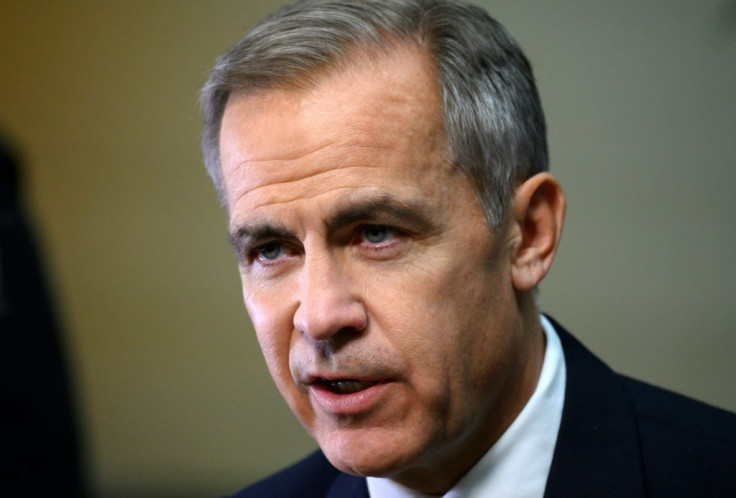Bank of England Cuts Rates To Mitigate Coronavirus Fallout, ECB May Do Likewise

KEY POINTS
- Boe cut rates to 0.25% a record low
- ECB president Lagarde warned virus may cause as much harm as 2008 crisis
- BoE also will fund cheap loans to help small UK businesses
In the wake of easing by the U.S. Federal Reserve last week, the Bank of England on Wednesday cut interest rates by 50 basis points to 0.25% -- a record low – in order to support the British economy against the negative impact of the coronavirus outbreak.
The BoE also announced it will provide 190 billion pounds [about $246 billion] of additional funds to help banks support companies through increased loans. The bank will also offer funding for cheap loans of 100 billion pounds [$129 billion] to small and mid-sized companies.
"These measures will help to keep firms in business and people in jobs and help prevent a temporary disruption from causing longer lasting economic harm," the bank stated.
The BoE's role is to “help U.K. businesses and households manage through an economic shock that could prove large and sharp, but should be temporary," said Mark Carney, the BoE’s outgoing governor.
Carney noted policymakers had witnessed a "sharp fall in trading conditions,” including spending on nonessential goods, and that the bank’s measures were designed to have "maximum impact.”
However, Carney emphasized that while the size of the economic fallout from the coronavirus remained unclear, the U.K. economy will likely contract in the next few months.
"I would emphasize the direction is clear, though the orders of magnitude are still to be determined," Carney added.
The governor also assured that economic damage from coronavirus will not be as extensive as what occurred during the 2008 financial crisis.
"There is no reason for it to be as bad as 2008 if we act as we have, and if there is that targeted support," he said.
Faisal Islam, BBC’s economics editor, wrote that the “dramatic emergency rate cut will dominate the headlines, but it is the overall package of measures which the departing Bank of England governor Mark Carney will stress as a support for the economy in this extraordinary coronavirus crisis.”
The key target of this move, Islam noted, is the 100 billion pound scheme to provide cashflow to “small and medium-sized businesses, which could be hit by a combination of slumping demand, trade difficulties and staff absence.”
Some analysts contend lowering rates might not be sufficient.
“Cutting borrowing costs by a few basis points from here is not going to be enough to embolden a company to open a new factory and hire workers, nor will it encourage consumers to buy from shops or inspire them to book a holiday,” said Dean Turner, economist at UBS Global Wealth Management.
Still, a rate cut “will help to support confidence in the markets, which has taken a severe knock over the past few days”, said Tej Parikh, chief economist at the Institute of Directors, a business organization.
“[BoE] policymakers are clearly concerned about the risks ahead,” said Kallum Pickering, senior economist at Berenberg investment bank. “The joint action reflects the intention to send a big message that policymakers are prepared to take aggressive and pre-emptive steps” to support the economy.
The BoE’s measures “won’t prevent the [British] economy stagnating or contracting in [the second and third quarters],” warned Paul Dales, chief U.K. economist, at Capital Economics, a consultancy, “but they will help to ensure that the economy can bounce back later this year and in 2021 once the virus has peaked.”
Islam added that coronavirus is “unique and highly unpredictable. There is a fundamental problem of people and businesses not being able to function because of the measures to contain the virus. The message from the [BoE] is that the banking system is fully padded up to help businesses get through this.”
Britain has recorded at least 382 coronavirus cases, with six deaths.
Meanwhile, Christine Lagarde, the president of the European Central Bank, which meets on Wednesday and Thursday, asked EU leaders to increase spending and bank lending to mitigate the effects of coronavirus on the continent.
Lagarde warned the virus outbreak could trigger an economic downturn in Europe like the one witnessed in 2008 unless EU governments extend financial support to their economies.
Lagarde added that the ECB is mulling over all its options – suggesting the bank will also cut rates, as well as offer a new stimulus package.
Italy, Europe’s third largest economy, is in a virtual national lockdown, while big economies France and Germany have reported rising infection cases.
“The economic and financial outlook [in Europe] has deteriorated. First, the Lombardy [Italy] quarantine is likely to increase the direct and indirect costs of the virus shock,” said Mark Wall, chief economist at Deutsche Bank. “Second, the tightening of financial conditions is worsening and broadening.”
© Copyright IBTimes 2024. All rights reserved.




















